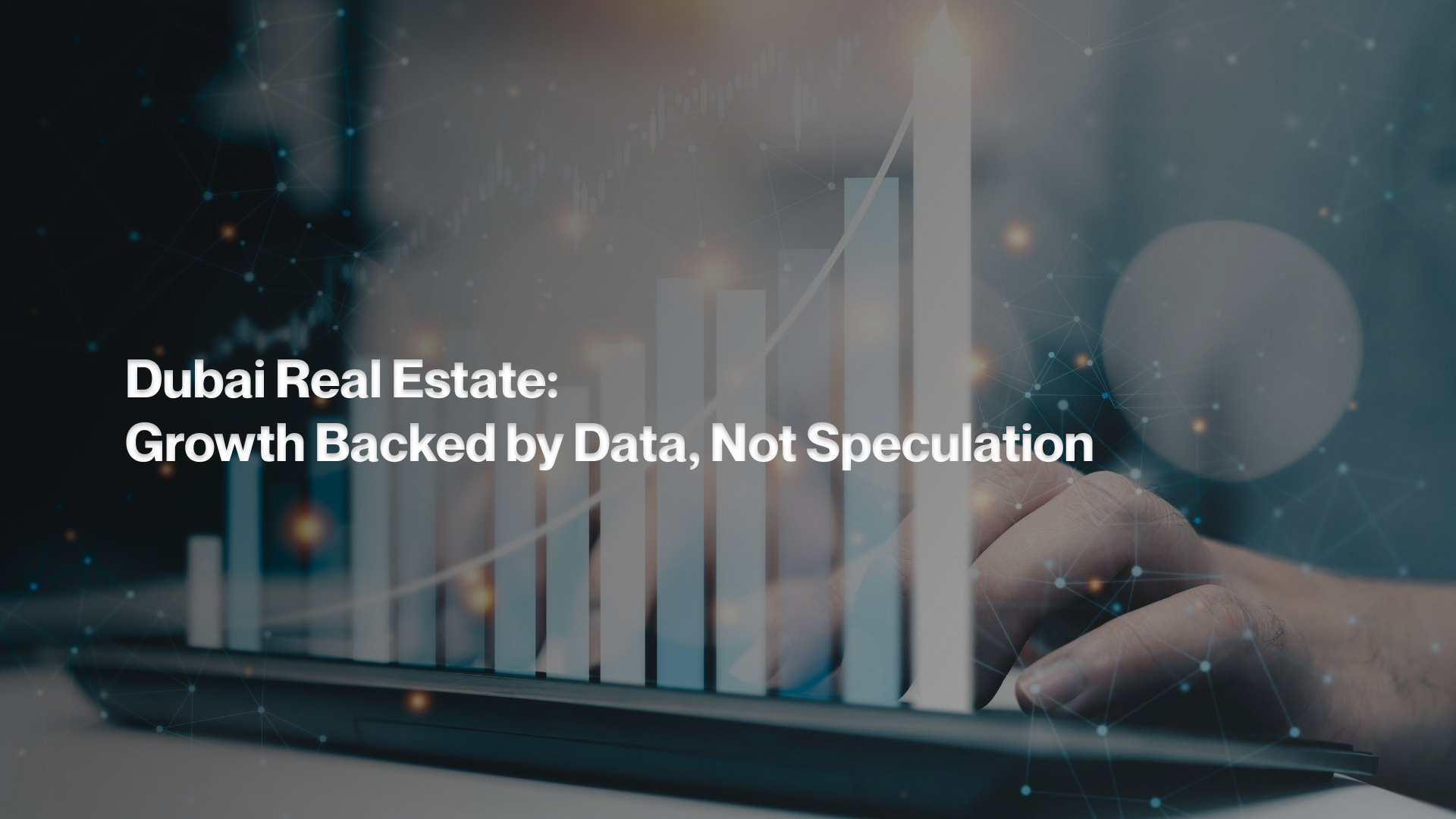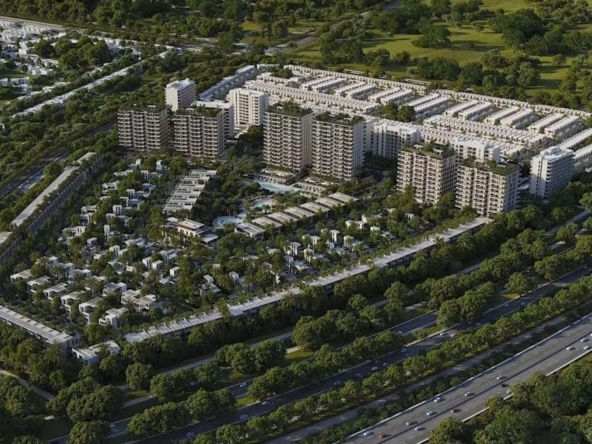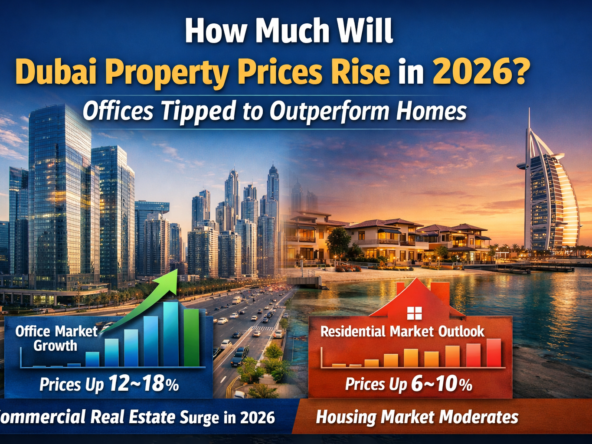The Dubai real estate market has matured into a dynamic, data-driven ecosystem, where sustained growth is increasingly supported by solid fundamentals rather than mere speculation. With strong demand from international investors, transparent government regulations, and a clear economic vision for the future, Dubai has evolved into a global property hub that is attracting buyers, developers, and institutions alike.
The Evolution of Dubai’s Real Estate Market
For decades, Dubai was known as a speculative playground where quick returns fueled investor interest. However, the landscape has significantly changed. Market growth today is anchored in population expansion, economic diversification, and long-term infrastructure development, making it more resilient and transparent than in the past.
According to official data from the Dubai Land Department (DLD), property transactions have hit record highs over the past few years. These numbers are not the result of inflated valuations or short-lived hype but of sustainable demand fueled by end-users and institutional investors.
Key Data Points Driving Sustainable Growth
1. Population and Demographic Growth
Dubai’s population surpassed 3.6 million in 2024 and is projected to reach 5.8 million by 2040. This growth creates consistent demand for residential, commercial, and mixed-use developments. Unlike speculative booms of the past, the current demand is structural, backed by job creation and Dubai’s position as a global business hub.
2. Foreign Direct Investment (FDI)
The UAE continues to attract billions in foreign direct investment, with real estate remaining a top sector for international capital inflows. High-net-worth individuals from Europe, Asia, and the Middle East are investing in Dubai not only for lifestyle but also as a secure wealth diversification strategy.
3. Government Policies and Regulatory Transparency
Regulatory frameworks such as the Real Estate Regulatory Authority (RERA) and digital transparency initiatives have strengthened investor confidence. The Golden Visa program has also encouraged long-term residency, ensuring more end-user demand rather than short-term speculative activity.
4. Tourism and Hospitality Growth
Dubai welcomed over 17 million tourists in 2023, supporting strong demand for hospitality-linked real estate such as serviced apartments and holiday homes. The tourism sector’s contribution to GDP continues to push the short-term rental market, providing investors with lucrative yields.
Residential Sector: End-User Demand as the Core Driver
The residential market is being driven by end-user demand, with families and professionals seeking long-term homes. According to DLD data, apartments remain the most traded property type, while villas and townhouses have seen exponential growth, especially in communities like Dubai Hills Estate, Arabian Ranches, and Palm Jumeirah.
Mortgage lending has also surged, showing that more buyers are financing their homes for actual use, not flipping. This indicates a mature, data-backed shift away from speculative practices.
Luxury Real Estate: A Global Magnet
Dubai has cemented its position as a top-tier luxury real estate destination. In 2024, Dubai ranked among the world’s leading cities for luxury property sales, driven by demand from ultra-high-net-worth individuals. Areas such as Palm Jumeirah, Downtown Dubai, and Dubai Marina have become hotspots for record-breaking transactions.
The demand for branded residences, such as those developed in partnership with international hotel chains and luxury brands, has surged. This trend is supported by global investors who see Dubai as a safe haven for long-term capital preservation.
Commercial Real Estate: Strengthened by Business Migration
The introduction of 100% foreign business ownership laws and favorable corporate tax structures has made Dubai highly attractive for multinational corporations. This is fueling demand for Grade A office spaces, particularly in districts like DIFC and Business Bay.
Data shows rising occupancy rates in commercial real estate, reflecting business migration from Europe, Asia, and Africa, consolidating Dubai’s role as a strategic global business hub.
Infrastructure and Mega Projects Supporting Growth
Dubai’s growth is inseparable from its infrastructure investments and mega projects. The Dubai 2040 Urban Master Plan focuses on sustainability, livability, and economic competitiveness. Some key developments include:
-
Expansion of the Dubai Metro and Etihad Rail network.
-
Smart city initiatives and AI-driven infrastructure planning.
-
Sustainable projects like Dubai Creek Harbour and Expo City Dubai.
These large-scale initiatives are data-backed strategies aimed at ensuring long-term growth, reducing reliance on oil revenues, and cementing Dubai’s reputation as a future-ready city.
The Role of Technology and PropTech
The real estate sector is witnessing a surge in PropTech adoption, making transactions faster, safer, and more transparent. From blockchain-enabled property deals to AI-driven market analytics, Dubai is positioning itself at the forefront of real estate technology innovation.
Data-driven decision-making tools are helping investors analyze market trends with precision, eliminating reliance on speculation.
Sustainability and Green Building Practices
The demand for eco-friendly, sustainable developments has accelerated, especially among institutional investors. Dubai’s commitment to the Net Zero by 2050 initiative has spurred developers to integrate green building technologies, renewable energy, and smart resource management.
Sustainability is no longer a marketing trend but a data-driven requirement for long-term investment viability.
Rental Market: Steady Yields with Global Appeal
The rental market remains one of the strongest pillars of Dubai real estate. With a growing expatriate population and strong tourist inflows, landlords continue to enjoy high occupancy rates and stable yields.
Key insights:
-
Average rental yields range between 6%–8%, outperforming global cities like London and New York.
-
The holiday home sector is booming, supported by platforms such as Airbnb and Dubai’s tourism growth.
-
Rental demand is shifting toward well-connected suburban communities with affordable pricing.
Why Dubai Real Estate Is a Data-Driven Market
Unlike speculative bubbles of the past, today’s Dubai property market is anchored by measurable factors:
-
Transaction volumes supported by end-users.
-
FDI inflows from diversified global sources.
-
Government-led transparency initiatives.
-
Population and job market growth.
-
Infrastructure-driven urban expansion.
The reliance on hard data rather than market hype has made Dubai’s real estate sector one of the most resilient and attractive investment destinations globally.
Conclusion: Dubai Real Estate as a Global Benchmark
Dubai real estate is no longer defined by speculation; it is a data-driven, sustainable, and transparent market that attracts both local and international investors. With robust fundamentals such as population growth, infrastructure development, and regulatory transparency, Dubai is set to remain a global leader in property investment.
For those seeking long-term, stable returns, Dubai offers a compelling case where growth is firmly backed by data, not speculation.




